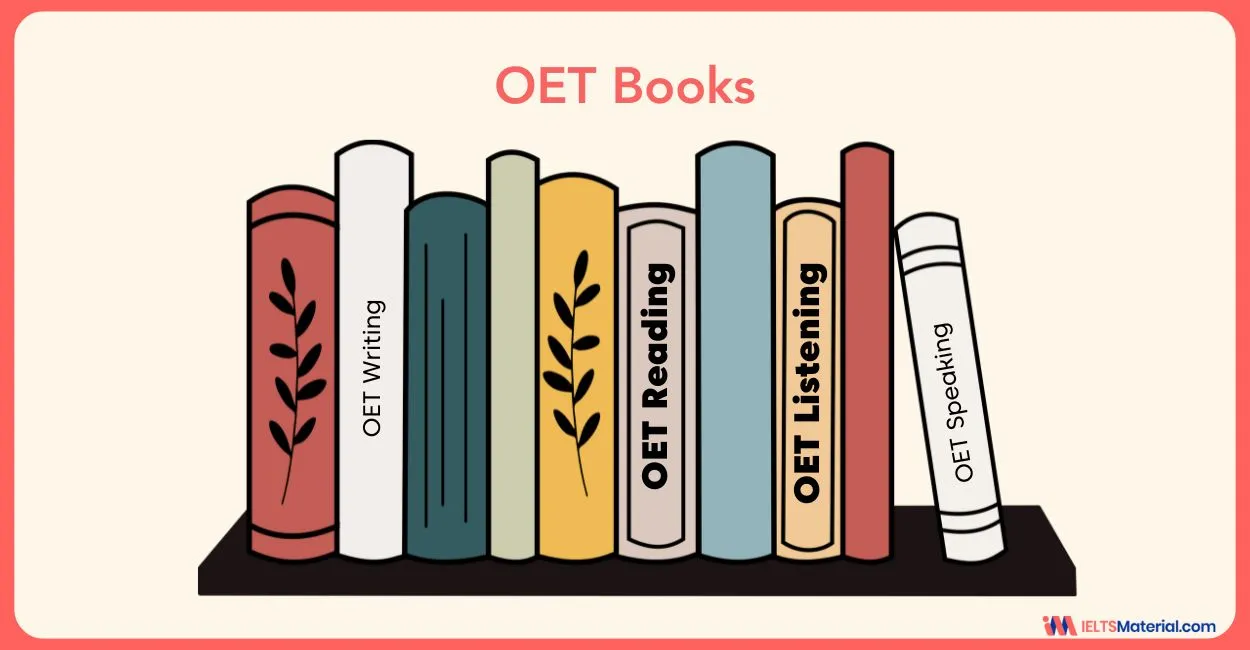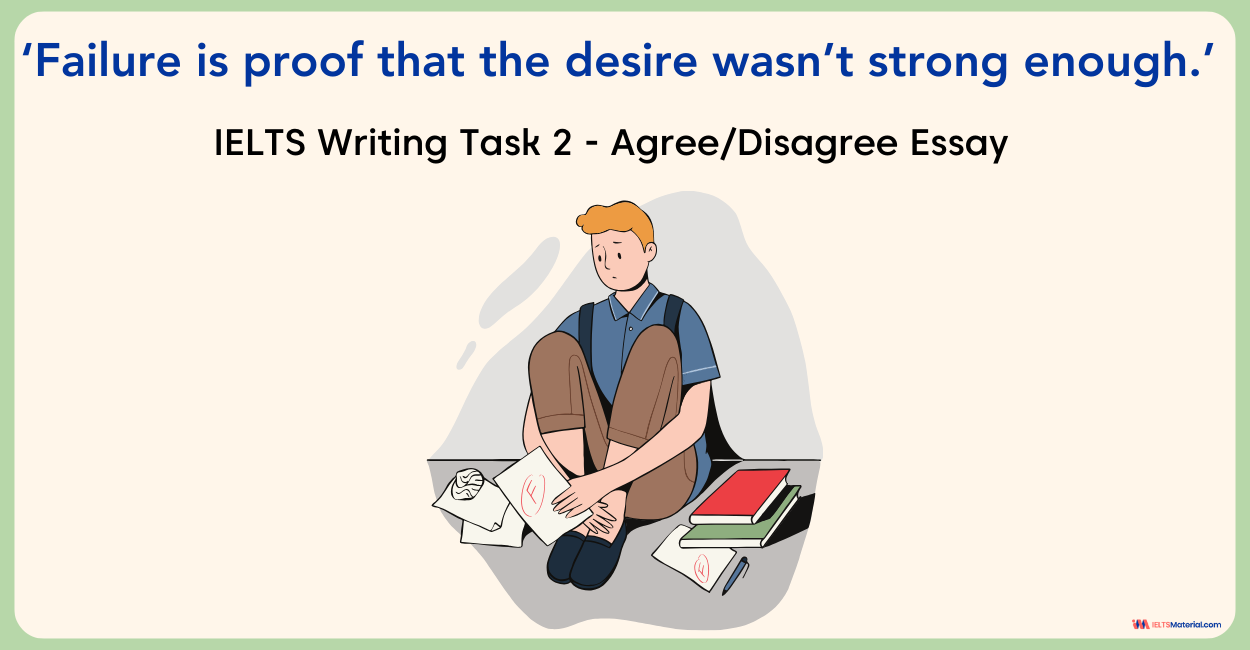IELTS Writing Task 2 – Failure is proof that the desire wasn’t strong enough
Table of Contents

Try AI Essay Checker for Instant Band Score
In this IELTS Writing Task 2 Agree/Disagree essay, we will challenge the notion that – Failure is proof that the desire wasn’t strong enough. We will look into the complexities of success, exploring multifaceted perspectives, real-world examples, and the transformative power of setbacks.
IELTS Writing Task 2 requires test-takers to compose a coherent essay in response to a given prompt. In Agree-Disagree essays, candidates express their stance on a statement and support it with relevant arguments. Graded on a scale of 1 to 9, achieving a Band 7, 8, or 9 indicates varying levels of proficiency.
Question
Failure is proof that the desire wasn’t strong enough. To what extent do you agree with this statement?
Give reasons for your answer and include any relevant examples from your own experience or knowledge.
You should write at least 250 words for each answer. You should spend about 40 minutes on this task.
Structural Breakdown
Type: Agree/Disagree Essay
Introduction
Body Paragraphs 1
Body Paragraphs 2
Conclusion
|
Here are some tips to master IELTS Writing Task 2 – Agree/Disagree Essay.
Band 7 Sample Answer
I partially agree with the statement that failure is proof that the desire wasn’t strong enough. While desire and motivation play crucial roles in achieving goals, attributing failure solely to a lack of desire oversimplifies the complex nature of success. Numerous factors contribute to success, including skill, opportunity, and external circumstances.
Desire serves as a driving force, motivating individuals to persevere through challenges. However, in some cases, failure may result from factors beyond one’s control, such as unforeseen obstacles or systemic barriers. For instance, an entrepreneur with a strong desire to launch a business may face economic downturns or market fluctuations that lead to failure despite their unwavering commitment.
Furthermore, failure often provides valuable lessons that can strengthen one’s resolve and desire. Thomas Edison famously said, “I have not failed. I’ve just found 10,000 ways that won’t work.” This perspective highlights how failure can be a stepping stone to success by refining strategies and approaches.
In conclusion, while a strong desire is undoubtedly a crucial element in achieving goals, it is not the sole determinant of success. External factors and the ability to adapt to setbacks also play significant roles in the journey toward accomplishing objectives.
Vocabulary
- Attribute – regard something as being caused by someone or something. Eg: It is unfair to attribute the project’s failure solely to one team member; multiple factors were at play.
- Persevere – continue in a course of action even in the face of difficulty or with little or no prospect of success. Eg: Despite numerous setbacks, she continued to persevere in her quest for a breakthrough in scientific research.
- Unforeseen – not anticipated or predicted. Eg: The sudden and unforeseen changes in market conditions caught many investors off guard.
- Systemic – relating to a system, especially as opposed to a particular part. Eg: The sudden and unforeseen changes in market conditions caught many investors off guard.
- Entrepreneur – a person who organizes and operates a business or businesses, taking on greater than normal financial risks in order to do so. Eg: As a serial entrepreneur, he founded and successfully managed multiple startups in the tech industry.
- Downturns – a decline in economic, business, or other activity. Eg: Economic downturns can pose significant challenges for businesses, affecting their profitability.
- Fluctuations – changes or variations, especially regularly occurring and relatively rapid changes. Eg: Currency fluctuations in the global market can impact the cost of imported goods.
- Resolve – firm determination to do something. Eg: With unwavering resolve, she tackled each obstacle in her academic journey to achieve academic success.
- Refining – improving or making small changes to something. Eg: The iterative process of refining the software led to a more user-friendly and efficient product.
- Adapt – make something suitable for a new use or purpose; adjust or modify. Eg: Successful leaders demonstrate the ability to adapt their strategies in response to changing market demands.
Band 8 Sample Answer
I find the statement “failure is proof that the desire wasn’t strong enough” to be an oversimplification of the intricate dynamics that contribute to success. While a strong desire is undeniably a critical factor in achieving goals, success is a multifaceted outcome influenced by various elements.
In many cases, failure is not a reflection of insufficient desire but rather a result of external circumstances and unforeseen challenges. The business world, for example, is fraught with uncertainties such as economic downturns or sudden shifts in consumer behavior that can lead to failure irrespective of one’s desire.
Moreover, success often requires a combination of factors, including skills, resources, and strategic planning. A person may possess a strong desire to excel in a particular field, but without the necessary skills or access to resources, success may remain elusive.
It is also essential to consider that failure is not always a dead end but a detour towards eventual success. Many successful individuals attribute their achievements to the lessons learned from failure. J.K. Rowling, the author of the Harry Potter series, faced multiple rejections before finding success. Her resilience and strengthened desire ultimately led to literary triumph.
In conclusion, while a robust desire is integral to success, it is only one piece of the puzzle. External factors, skills, and the ability to learn from failure are equally vital components in the intricate journey toward achieving goals.
Vocabulary
- Oversimplification – the act of simplifying something to the point of distortion or error. Eg: Presenting the complex economic theory in a single sentence is an oversimplification of its intricacies.
- Multifaceted – having many facets or aspects. Eg: Addressing the multifaceted challenges of climate change requires a comprehensive global effort.
- Irrespective – without taking into account; regardless of. Eg: The policy applies to all employees irrespective of their position within the organization.
- Detour – a long or roundabout route taken to avoid something or to visit somewhere along the way. Eg: Taking a detour through the scenic route added an extra hour to the road trip but provided breathtaking views.
- Resilience – the capacity to recover quickly from difficulties; toughness. Eg: The team’s resilience in the face of project setbacks ultimately led to its successful completion.
- Elusive – difficult to find, catch, or achieve. Eg: Finding a solution to the elusive problem took months of dedicated research and experimentation.
- Integral – necessary to make a whole complete; essential or fundamental. Eg: Effective communication is integral to building strong relationships in both personal and professional settings.
- Triumph – a great victory or achievement. Eg: The athlete’s triumph in the championship was the result of years of disciplined training and dedication.
- Dynamics – the forces or properties that stimulate growth, development, or change within a system or process. Eg: Understanding the dynamics of the global economy is crucial for making informed investment decisions.
- Circumstances – a fact or condition connected with or relevant to an event or action. Eg: Success is often influenced by the circumstances in which individuals find themselves.
Band 9 Sample Answer
Unlock Band 9 Sample Answer
If you want to have a look at the Band 9 Sample Answer, sign up!
The assertion that “failure is proof that the desire wasn’t strong enough” oversimplifies the intricate interplay of factors influencing success. Success is a nuanced outcome shaped by a myriad of elements, and while desire is undoubtedly a potent catalyst, it cannot be held as the exclusive barometer of one’s potential for success.
Firstly, attributing failure solely to a lack of desire overlooks external factors that can significantly impact outcomes. Economic, societal, and personal circumstances often contribute to the ebb and flow of success. For instance, a scientist with an unwavering desire to make groundbreaking discoveries may face funding constraints or lack the necessary equipment, impeding the realization of their goals.
Secondly, the complexity of success demands a holistic approach. While desire provides the initial impetus, the journey toward success requires a fusion of skills, strategic planning, and adaptability. A passionate entrepreneur may fail not due to a lack of desire but rather a deficiency in business acumen or an inability to navigate a dynamic market.
Moreover, failure is not a verdict but a transformative process. Visionaries like Steve Jobs faced setbacks but used them as opportunities for introspection and growth. Failure can refine one’s goals, enhance resilience, and fortify the very desire that propels success.
In conclusion, to reduce success or failure to the strength of desire alone is a myopic perspective. Success is a symphony orchestrated by desire, skills, external conditions, and the ability to evolve through setbacks.
Vocabulary
- Nuanced – characterized by subtle shades of meaning or expression. Eg: The author’s nuanced portrayal of characters added depth and realism to the novel.
- Barometer – something that reflects changes in conditions or opinions. Eg: Public opinion can serve as a barometer for gauging the effectiveness of government policies.
- Catalyst – a person or thing that precipitates an event or change. Eg: The new technology acted as a catalyst for innovation in the industry, driving significant advancements.
- Impetus – the force or energy with which a body moves. Eg: The successful launch of the new product provided the impetus for the company’s rapid expansion.
- Constraints – limitations or restrictions. Eg: Budget constraints limited the scope of the project, requiring careful resource allocation.
- Deficiency – a lack or shortage of something. Eg: The deficiency in essential nutrients in the diet resulted in health issues for the individual.
- Acumen – the ability to make good judgments and quick decisions. Eg: His business acumen allowed him to identify lucrative opportunities in the market.
- Myopic – lacking imagination, foresight, or intellectual insight. Eg: Taking a myopic view of long-term goals can hinder strategic planning and development.
- Orchestrate – to arrange or direct the elements of a situation to produce a desired effect. Eg: The project manager had to orchestrate the efforts of various teams to ensure seamless collaboration.
- Symphony – a thing forming a complex whole. Eg: A successful team operates like a symphony, with each member contributing harmoniously to achieve a common goal.
Effective Connectors That’ll Improve Your Writing Task 2 Score Significantly
Connectors play a crucial role in enhancing the coherence and flow of an essay. Here’s a list of common connectors used across different band levels in the provided answers:
- While
- However
- Moreover
- Furthermore
- In many cases
- For instance
- Additionally
- In conclusion
- Firstly
- Secondly
- Thirdly
- Moreover
- Nonetheless
- In conclusion
- On the other hand
- Also
- In summary
- To conclude
- Nevertheless
- In addition
Also, Check:
Practice IELTS Writing Task 1 based on report types

Start Preparing for IELTS: Get Your 10-Day Study Plan Today!
Recent Articles

Nehasri Ravishenbagam

Nehasri Ravishenbagam

Kasturika Samanta





Post your Comments